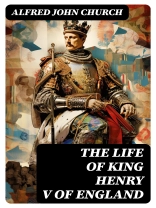Alfred John Church’s ‘The Life of King Henry V of England’ is a compelling exploration of the life and reign of one of England’s most iconic monarchs. Written in a narrative style that balances scholarly rigor with accessibility, Church employs a rich tapestry of historical records, literary sources, and vivid storytelling to illustrate Henry V’s transformative period during the Hundred Years’ War. Church meticulously reconstructs both the political and cultural contexts of Henry’s reign, showcasing his military prowess at Agincourt alongside his influence on English national identity. Alfred John Church, a noted scholar and classicist of the 19th century, was deeply influenced by his studies at Cambridge and his fervent interest in history and literature. His extensive expertise in Latin classics and medieval history shaped his narrative approach, allowing him to engage with the complexities of royal leadership and the development of the English state. Church’s scholarly environment and his advocacy for historical education provide insight into his motivations in capturing the essence of Henry V. This book is highly recommended for readers interested in medieval history, Shakespearean studies, or biographical literature. Church’s insightful analysis offers both enthusiasts and scholars a nuanced understanding of Henry V, inviting readers to appreciate the enduring legacy of a king who remains a pivotal figure in English history.
Despre autor
Alfred John Church (1829–1912) was a renowned English classical scholar and author, well-known for his accessible renditions of Latin and Greek texts into English prose for young readers. His work often sought to retain the spirit and substance of the original texts while adapting them to the sensibilities and comprehension of a broader audience. With a prolific career, Church contributed significantly to the popularization of classical literature. His scholarly endeavors bore fruit in the form of numerous adaptations, among which ‘The Life of King Henry V of England’ stands out as a historical narrative, blending the firm strokes of scholarly research with the appealing colors of storytelling suited for the Victorian age’s literary palate. His narrative style often infused didactic elements into his retellings, intending to provide moral education as much as entertainment. Church also penned works such as ‘Stories from Homer’ and ‘Stories from Virgil, ‘ which further solidify his reputation as a mediator between the ancient worlds and the 19th-century English reading public. His adaptations have been appreciated for their loyalty to the source material and their effort to maintain the cultural and educational value of the classics for younger audiences. Church’s contributions have ensured an enduring legacy in the field of classical literature and education.












